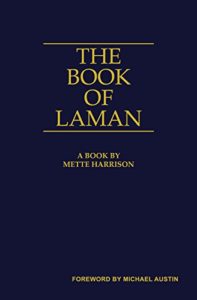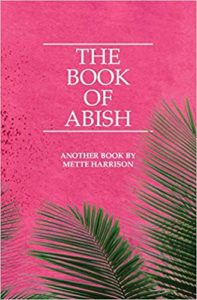Mette Ivie Harrison is introducing her latest novel, The Book of Abish, based on the characters which appear in Alma 19 in the Book of Mormon.
I don’t believe The Book of Mormon is a historical account of actual people who lived from 600 B.C. to 600 A.D. I didn’t come to this conclusion based on historians who have compiled seemingly exhaustive arguments about sources Joseph Smith either borrowed from or heavily influenced his understanding of the relationship between Native Americans and ancient Israel. I didn’t come to this conclusion based on a list of anachronisms from steel to horses in The Book of Mormon. I came to this conclusion based on my study of The Bible, The Old Testament and The New Testament. I came to this conclusion after I spent an entire year reading and re-reading The Sermon on the Mount, which is the basis of my deeper and changed understanding of God and community.
While I hear plenty of ex-Mormons cheering at the idea that someone like me would say this, as proof that the “truth claims” of the church are “collapsing,” this isn’t at all what it means to me. I believe that The Book of Mormon is scripture in the same way that the Bible is. The Book of Mormon is a book that tries to tell about a deep encounter with the divine. It uses a sweeping historical narrative to do this. It uses the voices of many different prophets to do this. It uses myth to do this. It is beautiful, and one of the things I love most about The Book of Mormon is the story of Alma the Younger’s conversion to faith in Christ, as well as the Sons of Mosiah who show their repentance through missionary work. In particular, I love the story of Ammon.
I love the idea that we can change completely in the course of a day, because of a singular experience. This happened to me when my daughter died in 2005. I stopped being the person I had been. I became a new person who might not be recognizable to myself or to other people who knew me then. I started to see the world in reverse of what I had before, rejecting some of my previous strict morality and adopting a different moral code based on love and mercy. The story of Ammon, who goes to preach the gospel to the Lamanites, when he knows he is likely to be killed, is a lovely story.
As a child, I loved the gore of all those arms chopped off. But as an adult, I loved the way in which Abish, the servant of the king, becomes the hero of the story. Just as in Christ’s parables, it’s the forgotten woman, the lowly servant, who saves both the king and the kingdom. So I wrote The Book of Abish to celebrate this woman’s story as a kind of “midrash,” a further exploration of a scripture in a way that is meant to be enlightening, inspirational, and respectful.
I hope it isn’t arrogant of me to say that in fifty years, I suspect that of all my books, The Book of Abish may be the one that people remember me most for, because it will change radically their experience with a beloved scripture, expanding it and making it even more beloved. Through Abish, I have a chance to share my testimony of God, who loves all of us humans, no matter how lost or unimportant we may seem to be.
 In the process of writing this story, I had to create a lot of female characters. I did that on purpose, just as I added strong women to the story of The Book of Laman. I wanted this story to have an abundance of real, powerful women who make choices that matter. Abish’s mother is as much a hero as her husband or her daughter. Each of Abish’s six sisters feels the power of God in one way or another. And there are other women, the queen and her daughters. Just because they aren’t named in The Book of Mormon itself, we can’t imagine that there wouldn’t have been women there, doing what women have always done: saving the world.
In the process of writing this story, I had to create a lot of female characters. I did that on purpose, just as I added strong women to the story of The Book of Laman. I wanted this story to have an abundance of real, powerful women who make choices that matter. Abish’s mother is as much a hero as her husband or her daughter. Each of Abish’s six sisters feels the power of God in one way or another. And there are other women, the queen and her daughters. Just because they aren’t named in The Book of Mormon itself, we can’t imagine that there wouldn’t have been women there, doing what women have always done: saving the world.
I don’t need to believe that these women were historical to believe that they’re important. I spent much of my early career as a writer retelling fairy tales and epics, from Snow White to Tristan and Isolde and The Nibelungenlied. Women are part of these important myths that teach us truths about ourselves and our world, and about the supernatural. I believe deeply in God and that God has interaction with us on a regular basis, and that we have a duty to each other to report on our experiences. Abish has this duty to her people and I have it to mine.
Joseph Smith had the same duty. To me, complaining that he wasn’t “translating” this isn’t at issue. I’m content to remind people that “Truth” isn’t a set of facts. “Truth” is what teaches us what it means to be human, and how to be lifted up to the divine. That’s what Joseph taught us. That’s what Abish teaches us. The whole idea that we separate books into “fiction” and “non-fiction” is very interesting to me, because it seems to indicate that some people believe that non-fiction contains facts unfiltered through any lens, which is obviously not true, and that fiction is a bunch of lies, which is also obviously not true. Is The Book of Abish fiction? Yes, fiction of the truest kind, I hope.

